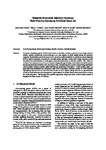Towards Simulated Morality Systems: Role-Playing Games as Artificial Societies
| dc.contributor.author | Casas-Roma, J | |
| dc.contributor.author | Nelson, M | |
| dc.contributor.author | Arnedo-Moreno, J | |
| dc.contributor.author | Gaudl, Swen | |
| dc.contributor.author | Saunders, R | |
| dc.date.accessioned | 2019-10-30T10:35:42Z | |
| dc.date.available | 2019-10-30T10:35:42Z | |
| dc.date.issued | 2019 | |
| dc.identifier.isbn | 9789897583506 | |
| dc.identifier.uri | http://hdl.handle.net/10026.1/15088 | |
| dc.description.abstract |
Computer role-playing games (RPGs) often include a simulated morality system as a core design element. Games' morality systems can include both god's eye view aspects, in which certain actions are inherently judged by the simulated world to be good or evil, as well as social simulations, in which non-player characters (NPCs) react to judgments of the player's and each others' activities. Games with a larger amount of social simulation have clear affinities to multi-agent systems (MAS) research on artificial societies. They differ in a number of key respects, however, due to a mixture of pragmatic game-design considerations and their typically strong embeddedness in narrative arcs, resulting in many important aspects of moral systems being represented using explicitly scripted scenarios rather than through agent-based simulations. In this position paper, we argue that these similarities and differences make RPGs a promising challenge domain for MAS research, highlighting features such as moral dilemmas situated in more organic settings than seen in game-theoretic models of social dilemmas, and heterogeneous representations of morality that use both moral calculus systems and social simulation. We illustrate some possible approaches using a case study of the morality systems in the game The Elder Scrolls IV: Oblivion. | |
| dc.format.extent | 244-251 | |
| dc.language.iso | en | |
| dc.publisher | SCITEPRESS - Science and Technology Publications | |
| dc.subject | Role-Playing Games | |
| dc.subject | Multi-Agent Systems | |
| dc.subject | Morality Systems | |
| dc.subject | Artificial Societies | |
| dc.title | Towards Simulated Morality Systems: Role-Playing Games as Artificial Societies | |
| dc.type | conference | |
| dc.type | Conference Proceeding | |
| plymouth.author-url | https://www.webofscience.com/api/gateway?GWVersion=2&SrcApp=PARTNER_APP&SrcAuth=LinksAMR&KeyUT=WOS:000570385400028&DestLinkType=FullRecord&DestApp=ALL_WOS&UsrCustomerID=11bb513d99f797142bcfeffcc58ea008 | |
| plymouth.date-start | 2019-02-19 | |
| plymouth.date-finish | 2019-02-21 | |
| plymouth.volume | 1 | |
| plymouth.conference-name | 11th International Conference on Agents and Artificial Intelligence | |
| plymouth.publication-status | Published | |
| plymouth.journal | Proceedings of the 11th International Conference on Agents and Artificial Intelligence | |
| dc.identifier.doi | 10.5220/0007496702440251 | |
| plymouth.organisational-group | /Plymouth | |
| plymouth.organisational-group | /Plymouth/Faculty of Science and Engineering | |
| plymouth.organisational-group | /Plymouth/Faculty of Science and Engineering/School of Engineering, Computing and Mathematics | |
| plymouth.organisational-group | /Plymouth/REF 2021 Researchers by UoA | |
| plymouth.organisational-group | /Plymouth/REF 2021 Researchers by UoA/UoA11 Computer Science and Informatics | |
| plymouth.organisational-group | /Plymouth/Users by role | |
| plymouth.organisational-group | /Plymouth/Users by role/Academics | |
| dc.rights.embargoperiod | Not known | |
| rioxxterms.versionofrecord | 10.5220/0007496702440251 | |
| rioxxterms.licenseref.uri | http://www.rioxx.net/licenses/all-rights-reserved | |
| rioxxterms.type | Conference Paper/Proceeding/Abstract |


